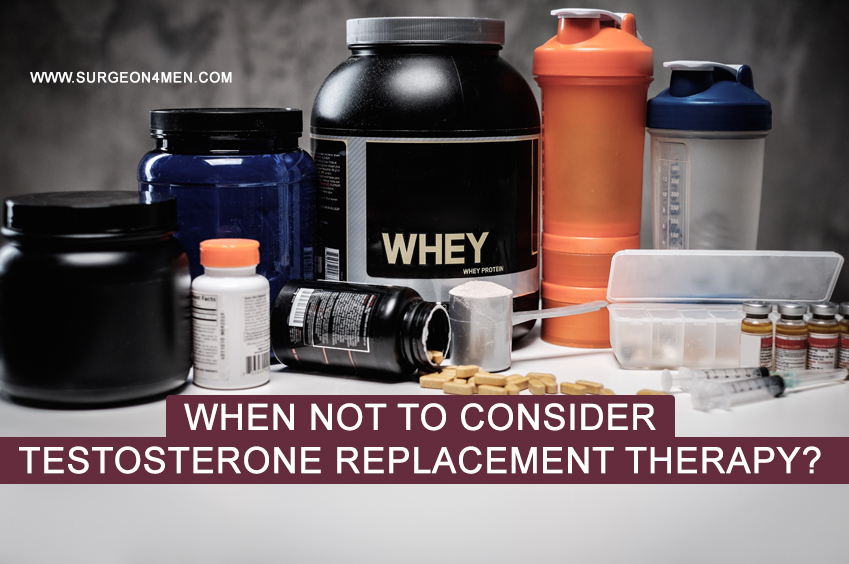When Not To Consider Testosterone Replacement Therapy?
Testosterone replacement therapy seems to be a magical treatment which can work wonders for manhood. However, many people are not aware of the full extent of the health risks associated with testosterone replacement therapy. It is imperative to keep in mind that testosterone replacement therapy has some benefits and it does work to restore the quality of life in some men, but it is not for everyone! Following are some scenarios in which testosterone replacement therapy is not advised.
-
When There Are Symptoms Of Low Testosterone Levels Only
Low testosterone is believed to be the classic indication for testosterone replacement therapy, but you shouldn’t consider the replacement option only if you are experiencing symptoms of low T. For example, low testosterone levels are characterized by loss of libido, fatigue, depression and erection problems. But, are these symptoms specific to low testosterone only?
Research and clinical data indicates that these symptoms are non-specific and may be reported in the setting of other hormonal disorders. Therefore, healthcare providers strongly recommend individuals to consider HRT after getting their testosterone levels evaluated by a series of hormonal assessment tests.
-
When Only Testosterone Level Is Low
Decline in testosterone is a natural phenomenon. After reaching 30 years of age, there is a gradual decline in the serum testosterone levels which aggravates drastically after your 60th birthday. Therefore, low T without any “symptoms” is not something that would require hormone replacement therapy.
-
Prostate Cancer
Testosterone therapy is contraindicated for men who are living with or are getting treatment for prostate cancer. This is mainly because testosterone may not directly induce cancer but can interfere with the treatment options. Even if someone has a history of successful treatment of prostate cancer, he must first discuss all the possible risks and consequences with their primary care doctor before considering HRT.
Testosterone hormone can enlarge the prostate gland therefore, if someone has prostate lumps or severe symptoms of urinary tract obstruction due to enlarged prostate, they should maintain extreme caution while considering testosterone replacement therapy as it may aggravate the symptoms of benign prostate enlargement.
-
If You Wish To Father Children In Future
Testosterone replacement therapy can actually lower your overall sperm count as suggested by a number of clinical and research studies. The exogenous or external) administration of testosterone inhibits the formation of natural testosterone by shutting down the brain signals sent to testicles. Usually sperm count begins to decline as early as 10 weeks after initiating the therapy.
-
If You Are Suffering From Polycythemia
Polycythemia is a pathological condition that is marked by excess amount of red blood cells in the body. Since testosterone is involved in the production of red blood cells, it has been observed that testosterone therapy may aggravate this condition. Poorly managed polycythemia can lead to stroke and heart attack due to:
- Unnatural clotting of blood
- Obstruction of blood vessels
- Limited delivery of blood to vital brain centers and other organs of the body
-
Sleep Apnea
Difficulty in breathing during sleep is called sleep apnea. Testosterone replacement therapy makes this condition worse. Men with sleep apnea should not opt for hormone therapy until or unless sleep apnea is completely treated.
-
Males Who Are Obese Or Overweight
One of the major reasons why most men consider testosterone therapy is abnormally low metabolism and resulting weight gain. Men who weighs 30 to 40 pounds higher than recommended body weight should lose their weight instead of getting testosterone replacement therapy.
Trials before actual treatment are very important because sometimes even if everything is fine, the therapy may not work due to other indications. Therefore, don’t hesitate to discuss alternative options when testosterone replacement therapy is not an option.
References
- Hsieh, T. C., Pastuszak, A. W., Hwang, K., & Lipshultz, L. I. (2013). Concomitant intramuscular human chorionic gonadotropin preserves spermatogenesis in men undergoing testosterone replacement therapy. The Journal of urology, 189(2), 647-650.
- Alavian, M., Rotker, K., Nelson, B., Miner, M., Sigman, M., & Hwang, K. (2014). MP48-07 EFFECT OF SUBCUTANEOUS TESTOSTERONE PELLET THERAPY ON DEVELOPING SECONDARY POLYCYTHEMIA. The Journal of Urology, 191(4), e529.
- Haider, A., Zitzmann, M., Doros, G., Isbarn, H., Hammerer, P., & Yassin, A. (2015). Incidence of prostate cancer in hypogonadal men receiving testosterone therapy: observations from 5-year median followup of 3 registries. The Journal of urology, 193(1), 80-86.
